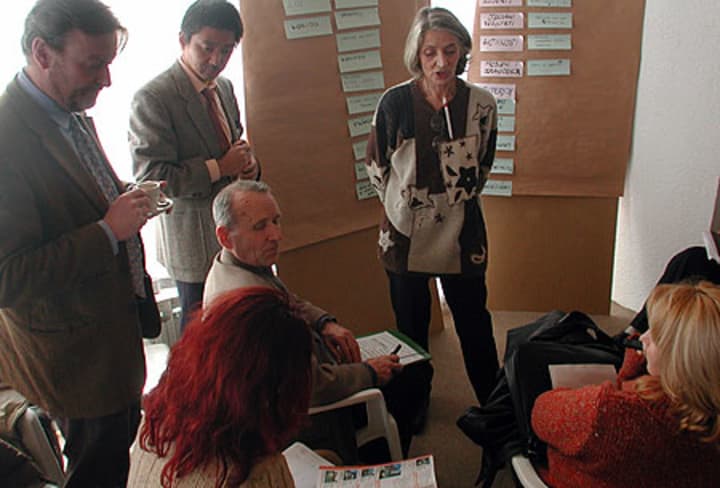
Souvenirs from all over the world adorn the office of Yuichiro Motomura, as well as notes of appreciation from foreign ministries, authorities and institutions. One document highlights a project in Qinghai province, a Chinese province neighboring Tibet.
When asked whether he has visited this remote and politically sensitive region in China, Motomura smiled. He has indeed, and vividly remembers the headache he suffered when arriving at 3,800 meters of altitude. Then again, how uncomfortable must Tibetans feel when visiting smog-ridden Beijing, he laughed.
Motomura’s interest in the world’s cultures and passion for what he does are palpable. After more than 25 years in international consulting, his enthusiasm is still fresh and vivid.
“This is not an easy job,” he said. “You have to go to the middle of nowhere, with little help, and you need to survive and to produce. But I can tell you, this is a very interesting job, very rewarding, because you get the results immediately.”
With a master’s in science from the Massachusetts Institute of Technology and experience in international consulting, Motomura returned to his native Japan in 1983 to create an internationally competitive consulting firm. Japanese and foreign experts in the field joined him, and Padeco was born.
Padeco’s internationalism is its key asset, Matomura and his colleagues agree.
“Padeco established itself among international clients almost from the firm’s inception and therefore was and remains more international than other Japanese development consulting firms, both in terms of its client base and its staff,” said Bruce Winston, Padeco director in charge of development banks and U.N. headquarters projects.
“Padeco is comfortable in working for both Japanese and international clients,” he added. “We can mobilize know-how developed in Japan and apply it in countries around the world.”
About 40 percent of the projects Padeco manages are funded by foreign clients such as the World Bank, Asian Development Bank, Inter-American Development Bank and European Bank for Reconstruction and Development. Padeco also has a long track record of collaboration with the Japan International Cooperation Agency, Japan Bank for International Cooperation and government agencies such as the ministries of foreign affairs and of land, infrastructure and transport.
Originally an expert in the transport sector, the firm is now active also in the fields of economic and social development, education, health, information and communication technology, privatization, tourism, gender and human resources, urban and regional planning, as well as energy and environment.
In all of these fields, Padeco intervenes by designing, implementing, managing and evaluating development projects. It also conducts feasibility studies and research on specific sectors, policies and strategies.
Padeco has carried out a series of technical assistance projects on behalf of the Asian Development Bank, for instance, to address non-physical barriers to the cross-border movement of goods and people in the greater Mekong area.
“The work,” Winston said, “has led to the signing and implementation of an important international treaty and related agreements by six countries that have historically not always had peaceful relations with each other.”
In a world that has become tightly interconnected, Motomura’s firm stresses the importance of understanding diversity and tailoring ad-hoc approaches to development. That’s why in conversations with clients, Padeco highlights the added value provided by the company’s diverse and multidisciplinary staff.
Padeco’s internationalism is still unusual in Japan’s traditional business world.
“It is difficult to penetrate the local government market in Japan as it is traditionally served by more domestically minded firms with long-established client relationships,” Winston explained.
On a foreign scale, he continued, “international development agencies with a strong regional orientation are more difficult than the ones closest to Japan.”
A presence in Europe is needed for establishing a fruitful cooperation with the European Bank for Reconstruction and Development, for instance, and Spanish-speaking staff makes a partnership with the Inter-American Development Bank easier, according to Motomura.
Padeco handles an average of 60 projects per year, and plans to remain markedly international as Japan’s development assistance shrinks. According to Winston, the company will focus more on projects in Africa.




